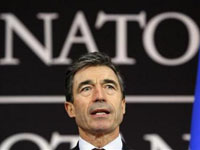Fogh Rasmussen Sets Russia for Friendly Mode
Russia should stop seeing the West as a threat, NATO Secretary General Anders Fogh Rasmussen said Thursday, as he called for a new partnership between Moscow and the transatlantic alliance.

Relations between NATO and Moscow plunged to a post-Cold War low after the August 2008 war between Russia and Georgia, but Rasmussen has made improving ties a priority since coming to office in August.
"Let me make a very clear statement as secretary general of NATO. NATO will never attack Russia. Never," Rasmussen said in a speech to students at the country's top diplomatic university.
"And we don't think Russia will attack us either. We have stopped worrying about this and Russia should stop worrying about this as well," he told the students, who responded with applause.
The North Atlantic Treaty Organization (NATO) was created at the start of the Cold War under the principle of collective defence, whereby members would jointly respond to any attack by an aggressor, at that time feared to be the Soviet Union.
If trust can be built between Moscow and NATO "then Russia can stop worrying about a menace from the West that simply doesn't exist," Rasmussen said.
"She can put her resources into defending against the real threats this country faces -- like terrorism, extremism, proliferation of missiles and weapons of mass destruction or drug trafficking."
Rasmussen, who had met President Dmitry Medvedev and Prime Minister Vladimir Putin on Wednesday, said that a trusting relationship between Russia and the transatlantic alliance "has enormous potential to make Russia safer, to make the NATO allies safer and to make a real contribution to global security as well."
Rasmussen said that if his "vision" were fulfilled, by 2020 Russia and NATO would be able to link their missile systems to create a "genuine missile shield in the Euro-Atlantic area".
He strongly defended the eastward expansion of NATO, which he acknowledged was "clearly something which many in Russia see as a deliberate strategy to encircle this country."
Russia has bristled at the moves by former Soviet republics like Georgia and Ukraine to join NATO and was also fiercely opposed to the now-shelved US plan to deploy missile defence facilities in Central Europe.
A day earlier, Rasmussen had asked Russia to step up its cooperation on Afghanistan, asking Moscow to send more helicopters for the Afghan government and to help train more Afghan police and counter-narcotics officers.
Such steps would ease the burden on NATO as it struggles to put down a raging Taliban insurgency.
Russia did not immediately say whether it would agree to the NATO requests, with Medvedev simply ordering a review of Rasmussen's proposals.
Russia's envoy to NATO, Dmitry Rogozin, cautiously praised the secretary general's visit.
"We were not expecting any breakthroughs, nothing like this was planned. On the other hand, I think the fact of the visit itself was helpful," Rogozin told reporters after the speech.
The AFP has contributed to the report.
Subscribe to Pravda.Ru Telegram channel, Facebook, RSS!


